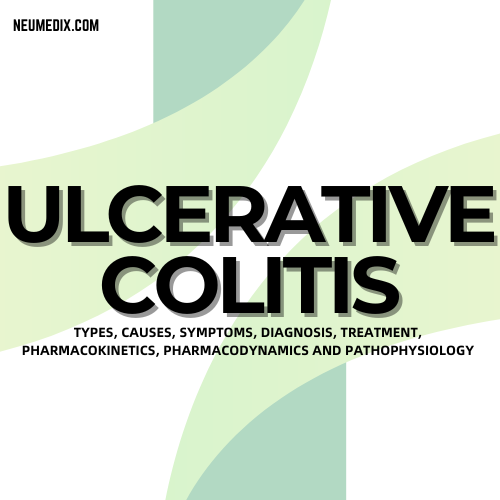Ulcerative colitis (UC) is a chronic inflammatory bowel disease (IBD) characterized by inflammation and ulcers in the lining of the colon and rectum. It is a lifelong condition that can cause symptoms ranging from mild to severe and may require ongoing management to control symptoms and prevent complications.
2. Symptoms of Ulcerative Colitis:
- Abdominal Pain: Crampy abdominal pain is a common symptom, often occurring in the lower left side of the abdomen.
- Diarrhea: Persistent diarrhea, which may contain blood or pus, is a hallmark symptom of UC.
- Rectal Bleeding: Blood in the stool or visible bleeding during bowel movements may occur.
- Urgency and Tenesmus: The sudden urge to have a bowel movement (urgency) and a feeling of incomplete emptying of the bowel (tenesmus) are common.
- Fatigue: Chronic inflammation and frequent bowel movements can lead to fatigue and weakness.
- Weight Loss: Severe UC can lead to unintentional weight loss and malnutrition.
- Other Symptoms: Additional symptoms may include fever, loss of appetite, joint pain, and skin lesions.
3. Causes and Risk Factors:
- Immune System Dysfunction: The exact cause of UC is unknown, but it is believed to involve an abnormal immune response in which the immune system mistakenly attacks healthy tissue in the colon and rectum.
- Genetics: Individuals with a family history of UC or other autoimmune diseases are at higher risk.
- Environmental Factors: Factors such as diet, stress, and certain medications may trigger or exacerbate symptoms in susceptible individuals.
- Microbiome: Alterations in the gut microbiome, including changes in the composition of bacteria in the digestive tract, may contribute to the development of UC.
4. Diagnosis of Ulcerative Colitis:
- Colonoscopy: A colonoscopy is the most common procedure used to diagnose UC. During this procedure, a flexible tube with a camera (colonoscope) is inserted into the rectum and advanced through the colon to visualize the lining and take tissue samples (biopsies) for examination.
- Endoscopy: Flexible sigmoidoscopy or upper endoscopy may also be performed to evaluate the extent and severity of inflammation.
- Blood Tests: Blood tests may be conducted to assess inflammation levels, nutritional status, and to rule out other conditions.
- Stool Tests: Stool samples may be analyzed for the presence of blood, infection, or inflammation.
5. Pharmacokinetics (PK) and Pharmacodynamics (PD) of Ulcerative Colitis Treatment:
- Anti-Inflammatory Medications: Aminosalicylates (such as mesalamine) and corticosteroids (such as prednisone) are commonly used to reduce inflammation and control symptoms during flare-ups.
- Immunosuppressants: Medications such as azathioprine, 6-mercaptopurine, or methotrexate may be prescribed to suppress the immune system and reduce inflammation.
- Biologic Therapies: Biologic drugs, such as anti-TNF agents (infliximab, adalimumab), vedolizumab, or ustekinumab, target specific components of the immune system to reduce inflammation.
- Janus Kinase (JAK) Inhibitors: JAK inhibitors, such as tofacitinib, may be used to block the activity of certain enzymes involved in inflammation.
6. Pathophysiology of Ulcerative Colitis:
- UC is characterized by chronic inflammation and ulceration of the colon and rectum.
- The inflammation in UC typically starts in the rectum and may extend continuously through the colon in a continuous fashion.
- Immune cells infiltrate the lining of the colon and produce inflammatory chemicals, leading to tissue damage, ulceration, and the characteristic symptoms of UC.
- Genetic predisposition, environmental factors, and alterations in the gut microbiome may all contribute to the development and progression of UC.
7. Non-Pharmacological Treatment and Lifestyle Modifications:
- Dietary Changes: Some individuals with UC may benefit from dietary modifications, such as avoiding trigger foods that exacerbate symptoms and consuming a low-residue or low-FODMAP diet during flare-ups.
- Stress Management: Stress can exacerbate symptoms of UC, so stress-reduction techniques such as mindfulness, yoga, or therapy may be helpful.
- Smoking Cessation: Smoking has been linked to an increased risk of UC and may worsen symptoms, so quitting smoking is recommended.
8. Conclusion: Ulcerative colitis is a chronic inflammatory bowel disease characterized by inflammation and ulcers in the colon and rectum. It can cause symptoms such as abdominal pain, diarrhea, rectal bleeding, fatigue, and weight loss. Diagnosis involves a combination of colonoscopy, endoscopy, blood tests, and stool tests. Treatment aims to reduce inflammation, control symptoms, and prevent complications through medications, lifestyle modifications, and, in some cases, surgery. With proper management, many individuals with UC can achieve remission and lead fulfilling lives. If you experience symptoms suggestive of UC, consult a healthcare professional for evaluation and treatment.




